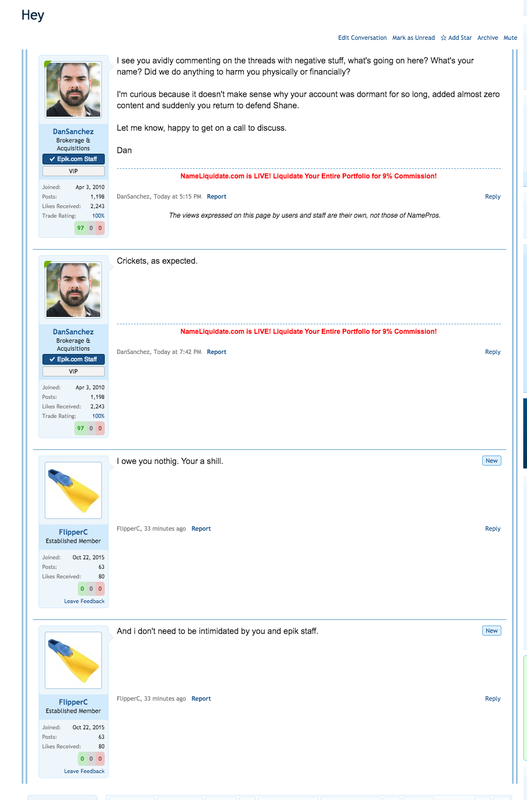- Impact
- 18,389
Earlier this morning, I wake up to seeing a lovely comment from Shane Cultra on his blog:

To my eyes, that comment from Shane is actually pretty crazy. Ironically, many people told me unsolicited, that my question was the highlight of the Q&A. This is not the first time that Shane has spoken out of school against me with trash-talk and it probably won't be the last since it shamelessly drives up his page views for his affiliate site. I don't know if anyone has a video of the Q&A section of Aman's keynote but if so, would be great if someone would upload the actual video clip. I believe anyone who objectively reviews my question will find it to be rather selfless. It was a question about domain liquidity. There were 2 parts, and I believe they were reasonable and sincere.
Part 1: Domain Liquidity via Loans
As some folks know, Epik provides interest-free loans secured by domains. This is popular but we cannot lend to everyone in the amounts that everyone might like. Compared to Godaddy, we are a relatively small company without access to the vast pool of capital that Godaddy has access to. I asked if Godaddy would consider extending domain loans to its customers. The lending model is proven. Godaddy has the ability to scale it to a much greater degree. Rather than forcing Godaddy customers to abandon domains to their expiry stream, why not allow Godaddy customers with liquid names to borrow against their portfolio? It seems reasonable to me.
Part 2: Working with US Congress to make domain names a bankable asset.
I have also been a long-time believer in the potential for domain names to be a respected asset class. The challenge there is that the banking industry does not recognize domains as a bankable asset class. People can donate domains to non-profits and can get a write-down for their investment basis, but if you go to a bank and ask to borrow against a 3N.com, they have no idea what you are talking about. The House subcommittee on banking could engage here but we would need some lobbying power to make that happen.
For anyone who has ever studied the history of the housing market, the correlation between the availability of borrowing capacity and the prices of the associated asset is indisputable. When credit is available, asset prices go up. If domain owners could more methodically borrow against their domains at conventional banking rates rather than only from hard money pawnshops that dominate the landscape today, it would be a game-changer for making the pie bigger for everyone.
I will be interested to hear what folks have to say on this very reasonable topic about domain liquidity that can greatly impact the future of the industry.
To my eyes, that comment from Shane is actually pretty crazy. Ironically, many people told me unsolicited, that my question was the highlight of the Q&A. This is not the first time that Shane has spoken out of school against me with trash-talk and it probably won't be the last since it shamelessly drives up his page views for his affiliate site. I don't know if anyone has a video of the Q&A section of Aman's keynote but if so, would be great if someone would upload the actual video clip. I believe anyone who objectively reviews my question will find it to be rather selfless. It was a question about domain liquidity. There were 2 parts, and I believe they were reasonable and sincere.
Part 1: Domain Liquidity via Loans
As some folks know, Epik provides interest-free loans secured by domains. This is popular but we cannot lend to everyone in the amounts that everyone might like. Compared to Godaddy, we are a relatively small company without access to the vast pool of capital that Godaddy has access to. I asked if Godaddy would consider extending domain loans to its customers. The lending model is proven. Godaddy has the ability to scale it to a much greater degree. Rather than forcing Godaddy customers to abandon domains to their expiry stream, why not allow Godaddy customers with liquid names to borrow against their portfolio? It seems reasonable to me.
Part 2: Working with US Congress to make domain names a bankable asset.
I have also been a long-time believer in the potential for domain names to be a respected asset class. The challenge there is that the banking industry does not recognize domains as a bankable asset class. People can donate domains to non-profits and can get a write-down for their investment basis, but if you go to a bank and ask to borrow against a 3N.com, they have no idea what you are talking about. The House subcommittee on banking could engage here but we would need some lobbying power to make that happen.
For anyone who has ever studied the history of the housing market, the correlation between the availability of borrowing capacity and the prices of the associated asset is indisputable. When credit is available, asset prices go up. If domain owners could more methodically borrow against their domains at conventional banking rates rather than only from hard money pawnshops that dominate the landscape today, it would be a game-changer for making the pie bigger for everyone.
I will be interested to hear what folks have to say on this very reasonable topic about domain liquidity that can greatly impact the future of the industry.
Last edited:








